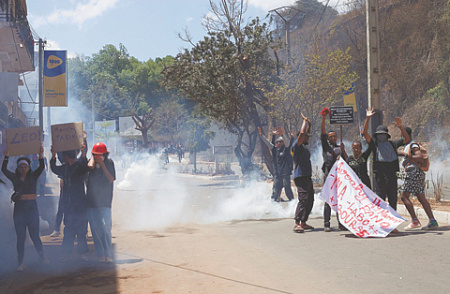
In a dramatic turn of events on the island nation of Madagascar, massive youth-led protests have forced President Andry Rajoelina to dissolve his government and announce the formation of a new cabinet. This move follows days of violent demonstrations that echo the recent “Gen Z revolution” in Nepal, highlighting the growing power of youth movements in challenging established political orders.
The unrest, which began on September 25, was initially fueled by widespread public anger over chronic power and water shortages. Chanting slogans like “leo” (“we’re fed up”), students from the University of Antananarivo took to the streets to protest the failing infrastructure, which has struggled to keep pace with a population that has swelled from 10 million to 32 million over 40 years, and a state utility company, Jirama, plagued by corruption allegations.
What started as a protest against utility failures quickly morphed into a full-blown political crisis. The students were soon joined by ordinary citizens and opposition politicians, with demands escalating from stable electricity to the resignation of the president himself. The demonstrations turned deadly, with the United Nations reporting at least 22 people killed and over 100 injured amid clashes with security forces. The situation was further inflamed by the arrest of an opposition lawmaker, Antoine Rajerison, for participating in the rallies.
As the chaos mounted, criminal elements reportedly took advantage of the turmoil, with incidents of looting and robbery contributing to the instability. President Rajoelina’s swift response appears to be an attempt to de-escalate a situation spiraling out of his control. In a national address, he expressed condolences to the victims’ families and made an unprecedented announcement: an open recruitment drive for a new government.
In a highly unusual move, the president invited “all patriotic Malagasy people” with the necessary skills and integrity to submit their resumes to the presidential palace for consideration for ministerial posts. This unconventional approach is seen as a direct concession to the protesters’ demands for change and a move to stave off further unrest that could threaten his own position.
Rajoelina, who first seized power in a 2009 coup and was re-elected in 2023 amid allegations of irregularities, is now facing a critical test of his leadership. The current crisis gives his opponents fresh ammunition to challenge his legitimacy, recalling past political turmoil and controversial elections on the island.
While the formation of a new government may offer a temporary reprieve, observers remain skeptical that a simple cabinet reshuffle will be enough. The deep-seated socio-economic problems that drove people onto the streets persist. Without a comprehensive program of genuine reform to address poverty, corruption, and failing infrastructure, the calm is likely to be short-lived, with the risk of further protests remaining dangerously high.
